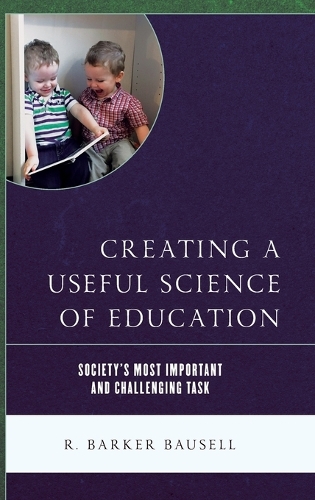
Creating a Useful Science of Education: Societys Most Important and Challenging Task
(Hardback)
Available Formats
Publishing Details
Creating a Useful Science of Education: Societys Most Important and Challenging Task
By (Author) R. Barker Bausell
Bloomsbury Publishing PLC
Rowman & Littlefield Publishers
4th October 2017
United States
Classifications
Professional and Scholarly
Non Fiction
Educational psychology
Educational strategies and policy
Research methods / methodology
370.72
Physical Properties
Hardback
152
Width 157mm, Height 239mm, Spine 16mm
372g
Description
Bausell provides a restrictive but defensible view of the purpose of educational research which is to produce instructional, curricular, or assessment products rather than seldom read and soon forgotten academic papers.This book poses and answers two questions: (a) whether it is possible for the science of education to develop into a discipline that could constructively impact the education of students and, if so (b) what type of research would be required for this transformation. Three genres of research were identified that possess the potential for impacting school instruction if the end result of this work is an instructional product capable of increasing learning by increased access to instruction or engagement therewith. Finally, specific suggestions are tendered for creating the infrastructure needed to realize this unique vision of what the science of education should be.
Reviews
In this exciting new, two-volume trek, Bausell introduces uswith insight and levityto diverse genres of unproductive research. Happily, he also tosses us several solution strategies to make our schools sparkle. -- Dr. W. James Popham, professor emeritus, UCLA and former president of the American Educational Research Association (AERA)
Dr.Bausell provides an insightful and long overdue summary andcritique of educational research, which, in addition to upsetting the status quo, should inform decisions made by academics, professionals,administrators, andpolicymakers alike. -- Harold Murai, professor emeritus, College of Education, Sacramento State University
Barker Bausells orientation toward education research and practice is consistent with his other body of work: careful analysis, removal of poetic distraction from science, with a dash of logical positivism. His desire is not to tear down education researchbut rather to help build a better applied scientific foundation. Indeed, various applied sciences are directed by political and financial motives as well as by a desire to understand a topic and, in this case, help people learn better. Sometimes other motives are barriers to improvement. He illustrates misdirected efforts and effective direction, using logic, systematic empirical summary, aspects of philosophy of science, and honesty. -- Steve Sussman, professor, Preventive Medicine, Psychology, and Social Work, University of Southern California
Author Bio
Dr. R. Barker Bausell was the first educational researcher to demonstrate the learning superiority of both tutoring and small group instruction when the curriculum, teacher differences, instructional time, and student differences were rigorously controlled. He served as a biostatistician, research methodologist, and the Director of Research in two departments within the University of Maryland over a 35+ year career and was the founding editor/editor-in-chief of the peer reviewed, Evaluation and the Health Profession for 33 of those years. He has authored 12 other books including: Conducting Meaningful Experiments: 40 Steps to Becoming a Scientist, Too Simple to Fail: A Case for Educational Change, and Snake Oil Science: The Truth about Complementary and Alternative Medicine.
